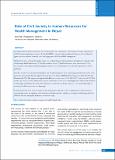Please use this identifier to cite or link to this item:
https://hdl.handle.net/20.500.14356/1847Full metadata record
| DC Field | Value | Language |
|---|---|---|
| dc.contributor.author | Prajapati, R | - |
| dc.contributor.author | Baral, B | - |
| dc.contributor.author | Karki, K B | - |
| dc.date.accessioned | 2023-05-26T06:41:48Z | - |
| dc.date.available | 2023-05-26T06:41:48Z | - |
| dc.date.issued | 2013 | - |
| dc.identifier.citation | Karki KB,P. R. B. B. (2013). Role of Civil Society in Human Resources for Health Management in Nepal. Journal of Nepal Health Research Council. https://doi.org/10.33314/jnhrc.v0i0.378 | en_US |
| dc.identifier.issn | Print ISSN: 1727-5482; Online ISSN: 1999-6217 | - |
| dc.identifier.uri | http://103.69.126.140:8080/handle/20.500.14356/1847 | - |
| dc.description | Special Issue Articles | en_US |
| dc.description.abstract | Abstract Background: The policy document of Nepal has spelled out commitment to involving civil society organisations (CSOs) in improving human resources for health (HRH). However, lack of empirical evidences, it is very hard to figure out exact situation about the roles and engagement of CSOs in HRH management. Methods: A cross-sectional descriptive study was conducted using both quantitative and qualitative methods. Out of 404 sample health institutions, 747 health workforce from 375 health institutions were interviewed (<10% non-response rate) using the probability proportionate to size method as per World Health Organization (WHO) guidelines. Results: Nearly 75% respondents had opined that the political parties were supporting the health institutions in the grassroots. It was found that the support from the CSO was better in Hill (54.9%) compared to Terai (46.9%) and Mountain (46.7%). The support was significantly different between rural (CI: 0.5063-0.591) and urban (CI: 0.3055-0.4363) (p <0.05, CI 95%). Mean index score of effectiveness of CSOs was found highest in Hills (0.3036) followed by Mountains (0.2669) and Terai (0.2589). Effectiveness of CSOs was found positively correlated with feeling of security by health workers and social prestige. Conclusions: The roles of civil society in HRH management still need to be recognized and well documented ensuring their active participation in formulation and implementation of policies, strategies and planning related to HRH for effective and quality healthcare services in Nepal. | en_US |
| dc.language.iso | en | en_US |
| dc.publisher | Nepal Health Research Council | en_US |
| dc.relation.ispartofseries | May-Aug, 2013;378 | - |
| dc.title | Role of Civil Society in Human Resources for Health Management in Nepal | en_US |
| dc.type | Journal Article | en_US |
| local.journal.category | Special Issue Articles | - |
| Appears in Collections: | Vol. 11 No. 2 Issue 24 May - Aug, 2013 | |
Files in This Item:
| File | Description | Size | Format | |
|---|---|---|---|---|
| 378-Article Text-402-1-10-20131127.pdf | Fulltext Download | 567.04 kB | Adobe PDF |  View/Open |
Items in DSpace are protected by copyright, with all rights reserved, unless otherwise indicated.
